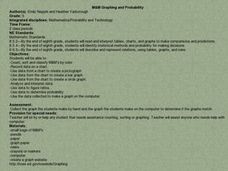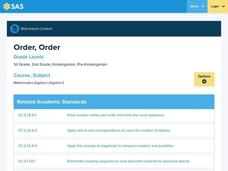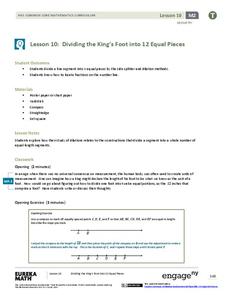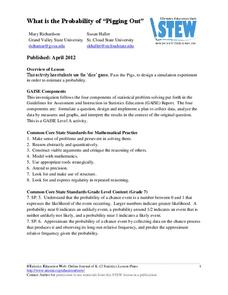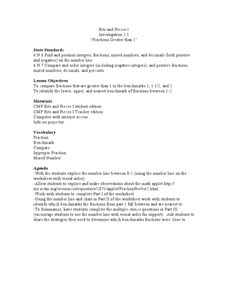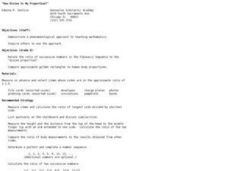Curated OER
Handling Data: measure of Average
Fifth graders analyze data from a simple table. In this graphing lesson, 5th graders compare distributions. Students recognize that the mean helps them find the formula. Students answer questions on the mean, median, and range.
Curated OER
Natural Inspiration
Learners relate math to the real world. In this algebra lesson, students compare plants to math and relate their artistic ability to concepts in math. They draw pictures of flowers, leaves and trees.
Curated OER
Problem Solving
Second graders practice problem solving strategies. In this problem solving instructional activity, 2nd graders use strategies such as guess and check, acting out, drawing pictures and looking for patterns to solve problems. Students...
Curated OER
M&M Graphing and Probability
Students sort, classify, and graph M & M's. They create pictographs and bar graphs with the colors and numbers in each bag of M & M's. They calculate the ratio and probability based on class results.
Pennsylvania Department of Education
Order, Order
Students use pictures to identify items as ordinal numbers. In this ordinal numbers lesson plan, students use the words "before" and "after" to identify the pictures as well.
Curated OER
Finding Addition Patterns
Students practice finding the sums of two-one digit numbers. In this addition lesson plan, students also record facts onto an addition chart.
Curated OER
Function Tables
Fourth graders explore the concept of function tables. In this function tables lesson, 4th graders compare the star machine in The Sneeches to function tables in math. Students practice creating and solving function tables.
Curated OER
Playing with Fractions: Wipe-Out
Students explore fractions by participating in a class math game. For this number sense lesson, students identify the numerator and denominator of different fractions while comparing their values. Students read the rules for the fraction...
Virginia Department of Education
Scientifically Speaking
Explore the connection between operations with scientific notation and the laws of exponents. Scholars work on a set of word problems involving operations with scientific notation. Along the way, they consider how the laws of exponents...
Curated OER
Buying in Bulk
Students investigate buying purchases in bulk. In this buying in bulk lesson, students consider ways to cut costs and reduce waste in landfills by making bulk purchases.
Curated OER
Count on Chinese Characters
Students research and use traditional Chinese characters to notate numbers. They compare and contrast Chinese calligraphy with Arabic numerals. Students demonstrate their comprehension of number concepts through their drawings and...
Curated OER
Patterns to the Rescue
Students identify different numbers and letters. They state the patterns in different sequences. They compare answers as a class.
EngageNY
Interpreting the Standard Deviation
Does standard deviation work for non-symmetrical distributions, and what does it mean? Through the use of examples, high schoolers determine the standard deviation of a variety of distributions and interpret its meaning. Problems require...
EngageNY
Analyzing Graphs—Water Usage During a Typical Day at School
Connect your pupils to the problem by presenting a situation with which they can identify. Individuals analyze a graph of water use at a school by reasoning and making conclusions about the day. The lesson emphasizes units and labels of...
West Contra Costa Unified School District
The Power of Ten: Building a Magnitude Model
Add visual representation to teaching place value with a magnitude model. Using adding machine tape, pupils build a linear place value strip from 1 to 100.
EngageNY
Dividing the King’s Foot into 12 Equal Pieces
Apply, apply, apply! A measurement lesson applies a number of concepts to help learn a new construction. Scholars learn to divide a segment into n equal parts using a method that uses the Side Splitter Theorem and a method that applies...
EngageNY
Solving General Systems of Linear Equations
Examine the usefulness of matrices when solving linear systems of higher dimensions. The lesson plan asks learners to write and solve systems of linear equations in four and five variables. Using matrices, pupils solve the systems and...
American Statistical Association
What is the Probability of “Pigging Out”
Learners apply their understanding of luck to a probability experiment. They play a game of Pass the Pigs to determine the probability of a specific outcome. Using analysis for their data, pupils declare the measures of center, dot...
Curated OER
Hands On Math Lessons with Technology
Students explore a variety of math concepts. In this integrating technology lesson, students visit online webtools such as Max's Math Adventure, I Know That Math, Hands on Banking, and more. A description of each website is provided.
Curated OER
Factors, Divisibility, and Relatively Prime
Seventh graders explore the concept of divisibility. In this divisibility lesson, 7th graders use divisibility rules to find factors of numbers. Students create foldables to illustrate divisibility rules.
Curated OER
Moons
Students practice rote counting to 20. After a lecture about the planets and the moons that surround them, they identify the number of moons surrounding various planets. Students compare and contrast the quantity of moons surrounding...
Curated OER
Understanding Fractions
Fourth graders compare fractions by using skittles and m&ms. In this math lesson, 4th graders explore the size of different fractions by cutting pieces of their pie for visual representation. Additionally, students discuss ways to...
Curated OER
Bits and Pieces: Fractions Greater Than One
Students compare fractions. For this fraction worksheet, students examine the number line. Using the Internet, they explore models of numbers greater than one. Students complete multiple-choice worksheets.
Curated OER
"How Divine Is My Proportion?"
Eighth graders explore the concept of the divine proportion/golden ratio. In this Fibonacci Sequence exploratory lesson, 8th graders measure the length and width of various objects to see which items have a divine proportion. Students...





